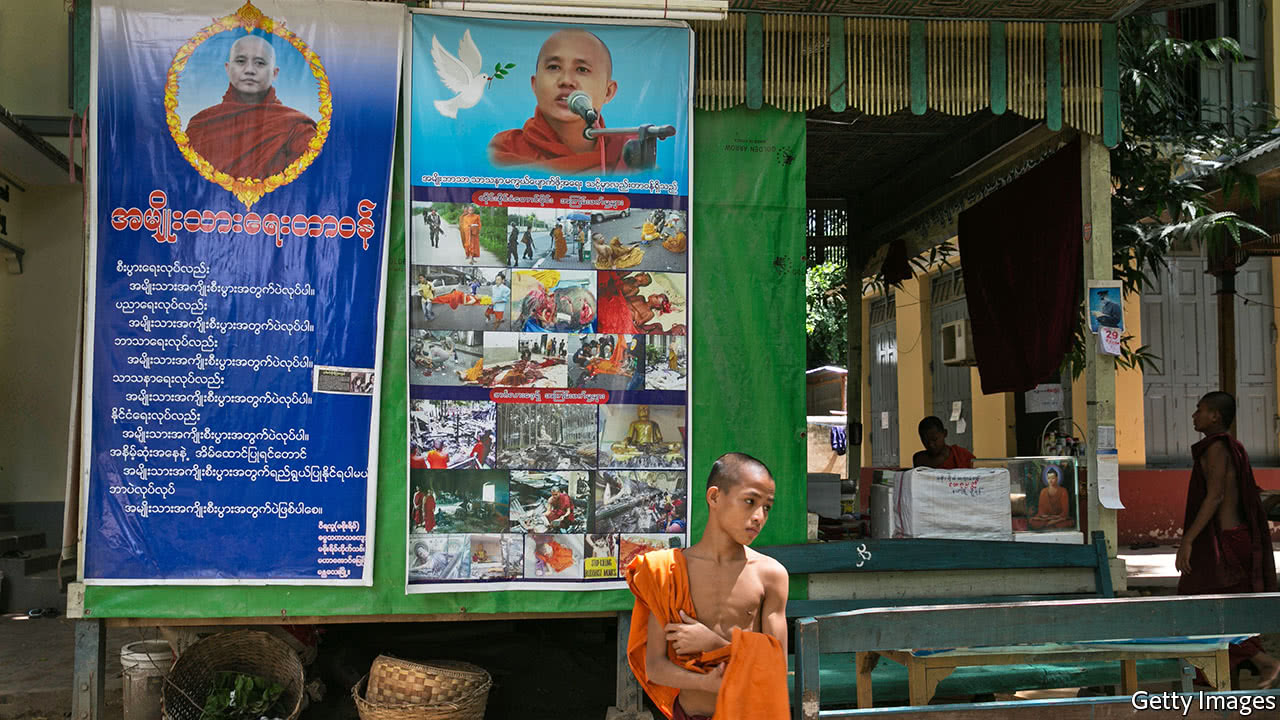Mantras of hate: Militant Buddhist monks are stoking sectarian tensions in Myanmar
They claim the Muslim minority poses a mortal threat to their religion

INSIDE a Buddhist monastery in Mandalay five teenagers are looking at a poster, bemused. A graphic collage of photos depicts children’s corpses, monks covered in blood and enraged jihadists brandishing weapons. A monk in a maroon robe approaches. “This is a reminder of what Muslims are like,” he says.
Ashin Wirathu, the most famous resident of the Masoeyein monastery, expands on the theme during a break between meditation sessions. Buddhism, he explains, is in danger. Centuries ago, he points out, Indonesia was principally a Hindu and Buddhist country, but it has since “fallen” to Islam. The Philippines, meanwhile, is struggling with “hordes” of jihadists. Myanmar, he warns, is next. As the leader of the most extreme fringe of the Organisation for the Protection of Race and Religion, a Buddhist charity best known by its Burmese acronym, Ma Ba Tha, he is mounting a fierce campaign to rouse Burmese Buddhists to confront this danger.
Muslims make up about 4% of Myanmar’s 54m people. Some claim to be Bamar, the country’s main ethnic group. Others are the descendants of immigrants from India during the British colonial period. Perhaps 1m are Rohingyas, a community of Bengali origin living in Rakhine state near the border with Bangladesh (see map). They are stateless, and have been excluded from Myanmar’s official list of 135 indigenous ethnic groups. The authorities consider them illegal immigrants, even though they have lived in Myanmar for generations.

Indeed, by most accounts it is Muslims, and especially Rohingyas, who are under threat in Myanmar. In recent years there have been sporadic attacks on mosques and on Muslim homes and businesses. Sectarian clashes descended into a pogrom against Rohingyas in Rakhine state in 2012 that claimed some 200 lives, the vast majority of them Muslims. Last year, after Muslim militants attacked several police posts in Rakhine, killing nine officers and stealing numerous weapons, the army went on a rampage. The UN and various human-rights groups say soldiers embarked on a campaign of rape, murder and other horrors, including the burning of Rohingya villages. Some 75,000 people have fled across the border into Bangladesh. Yet the authorities deny that the violence is widespread or systematic: this week they produced a report exonerating the security services.
Nonetheless, Ma Ba Tha’s fear-mongering finds many receptive ears. More than 2m people signed one of its petitions. “Muslims are cunning,” says a young Burmese in a tea shop. “They will outbreed us,” laments another. A taxi driver insists that Muslims never use his services: “Muslim money goes to Muslim businesses; that’s the way they think.” Such prejudices are common: a survey conducted in 2015 by the Myanmar Centre for Responsible Business, a non-profit, found that almost 90% of the hateful online posts they reviewed were directed at Muslims.
The new, civilian government has not been much better. It has allowed bureaucrats to close mosques and Islamic schools in Yangon at the behest of angry mobs. When members of the evicted congregations prayed in the street in protest, several of them were charged with “threatening stability and the rule of law”.
“We feel like second-rate citizens,” says a veiled Muslim woman living in Yangon. “We have to be very careful: a simple incident can turn into a riot.” On July 4th in Rakhine, for instance, a Rohingya man was killed by a group of Buddhists amid an argument over the purchase of a boat.
In recent months the authorities have tried to curb the extremists. The State Sangha, a government-appointed body of monks, banned the use of the acronym Ma Ba Tha in May, saying the group had not been set up in accordance with the proper procedures. Wirathu has responded by saying that it is the government, not Ma Ba Tha, that must go. Sympathisers have already set up a new charity and a separate political party. The leader of the party, Maung Thway Chon, says its mission is to “make Myanmar great again”.
Miss Suu Kyi has little to say about all this. Some argue that speaking out would be counterproductive: as it is, angry monks began protesting earlier this month outside Myanmar’s most famous temple, the Shwedagon, accusing the government of failing to protect Buddhism. But in elections in 2015, her party, the National League for Democracy, did not put forward a single Muslim candidate for parliament.
Source: The Economist Print version 12/08/2017








